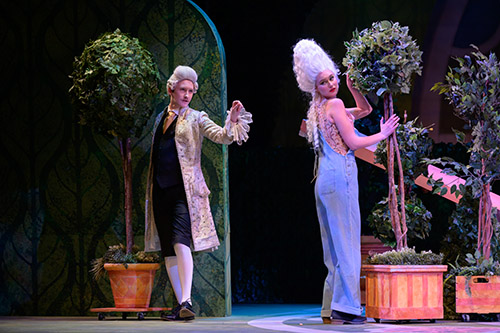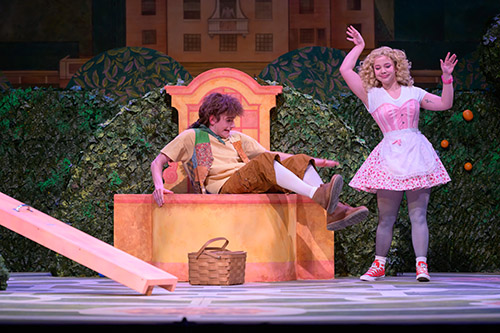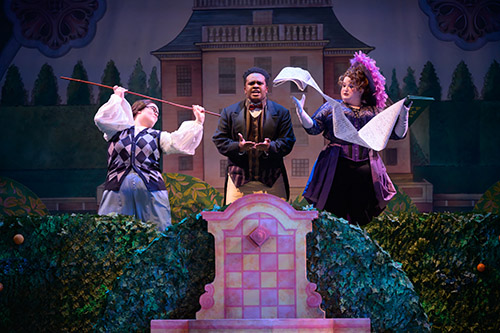by Daniel Hathaway

No, it’s been ten years since Jonathan Field’s outsized rabbits lock-stepped across the Hall Auditorium stage, adding another layer of absurdity to an already harebrained plot.
The opera centers on the pretend garden-girl of the title, Violante. Having been stabbed and left for dead by her jealous lover, Count Belfiore, Violante is still in love with him and seeks him out. She and her servant Roberto take up fake identities (under the names Sandrina and Nardo, respectively) as gardeners at the estate of the Podestà (a type of mayor). A love heptagon ensues, involving those mentioned plus the Podestà’s housekeeper (Serpetta), niece (Arminda), and niece’s ex-lover (Don Ramiro).

Havey treated romantic love as a form of play, turning the stage into a playground with a swing, a seesaw or teeter-totter, and balance balls as props on which mismatched couples flirted and argued.
Mozart wrote the score to La finta when he was 18, making the piece particularly well-suited for a college-age cast, and Oberlin Opera fielded a roster of singing actors with scarcely a weak link either musically or dramatically.

“In action” may be a strange way of putting it because there’s very little of that in the opera. Each character gets the stage alone for an aria, and Havey has left it up to them to invent their own characterization. Humorous gesture came off as spontaneous rather than micro-managed.
In the pit, conductor Christian Capocaccia kept the tempos moving and well-connected to the stage action. The Oberlin Orchestra sounded superb. The slightly offstage continuo team of harpsichordist Kyung-Eun Na and cellist Zach Price delivered supple underscoring in the recitatives.
In her director’s note, Stephanie Havey invites the audience to “step into our dreamy garden playground,” a demimonde colorfully realized by scenic designer Laura Carlson-Tarantowski and costume designer Chris Flaherty, and brightly illuminated by lighting designer Jeremy K. Benjamin.
No matter how much mistaken identity plays a role in the plot, everyone finally ends up with the right partner. No one dies and everyone lives happily ever after. In his later comedies, couples would seal the deal by getting married at the end, but the 18-year-old Mozart hadn’t thought of that outcome yet.
Published on ClevelandClassical.com April 3, 2025
Click here for a printable copy of this article


